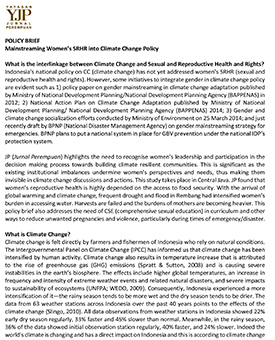Indonesia’s national policy on CC (climate change) has not yet addressed women’s SRHR (sexual and reproductive health and rights). However, some initiatives to integrate gender in climate change policy are evident such as 1) policy paper on gender mainstreaming in climate change adaptation published by Ministry of National Development Planning/National Development Planning Agency (BAPPENAS) in 2012; 2) National Action Plan on Climate Change Adaptation published by Ministry of National Development Planning/ National Development Planning Agency (BAPPENAS) 2014; 3) Gender and climate change socialization efforts conducted by Ministry of Environment on 25 March 2014; and just recently draft by BPNP (National Disaster Management Agency) on gender mainstreaming strategy for emergencies. BPNP plans to put a national system in place for GBV prevention under the national IDP’s protection system.
JP (Jurnal Perempuan) highlights the need to recognise women’s leadership and participation in the decision making process towards building climate resilient communities. This is significant as the existing institutional imbalances undermine women’s perspectives and needs, thus making them invisible in climate change discussions and actions. This study takes place in Central Java. JP found that women’s reproductive health is highly depended on the access to food security. With the arrival of global warming and climate change, frequent drought and flood in Rembang had intensified women’s burden in accessing water. Harvests are failed and the burdens of mothers are becoming heavier. This policy brief also addresses the need of CSE (comprehensive sexual education) in curriculum and other ways to reduce unwanted pregnancies and violence, particularly during times of emergency/disaster.


